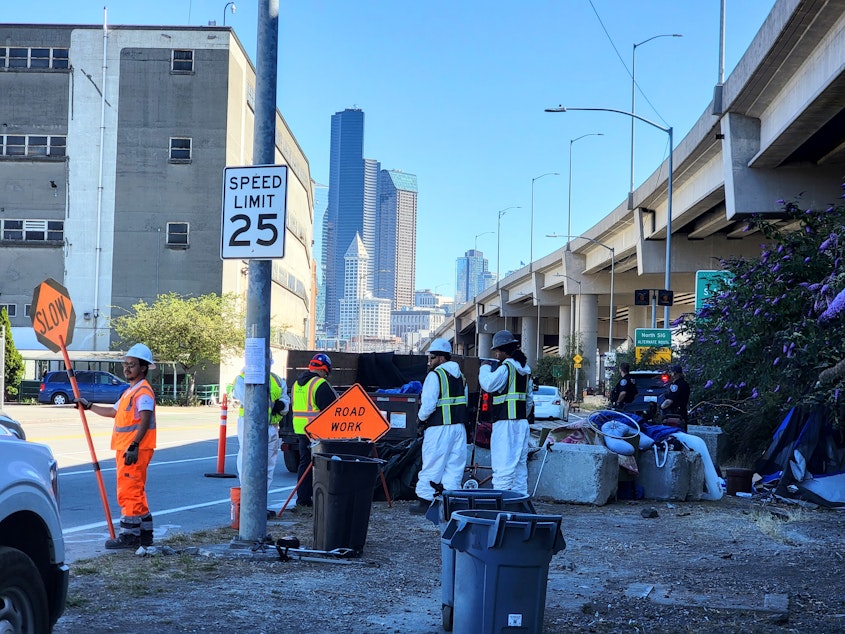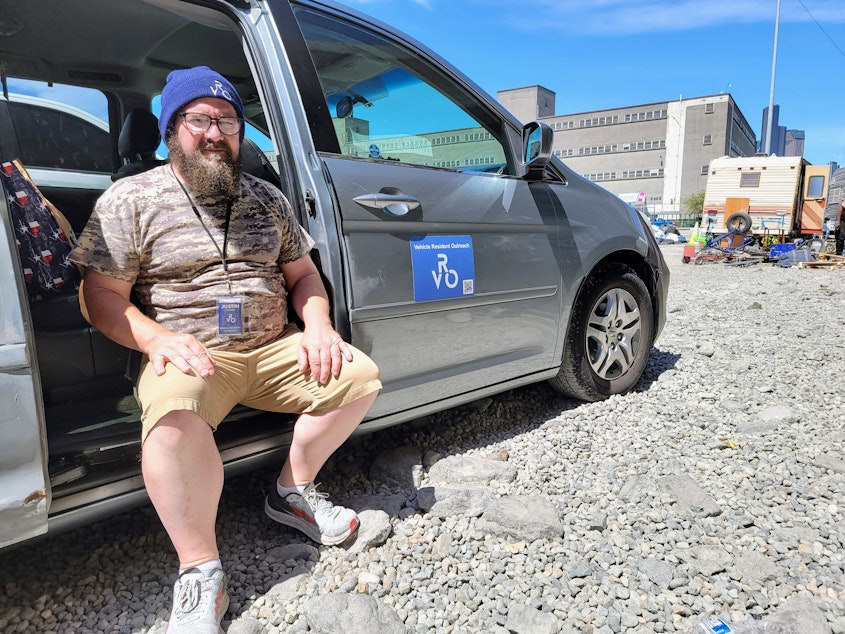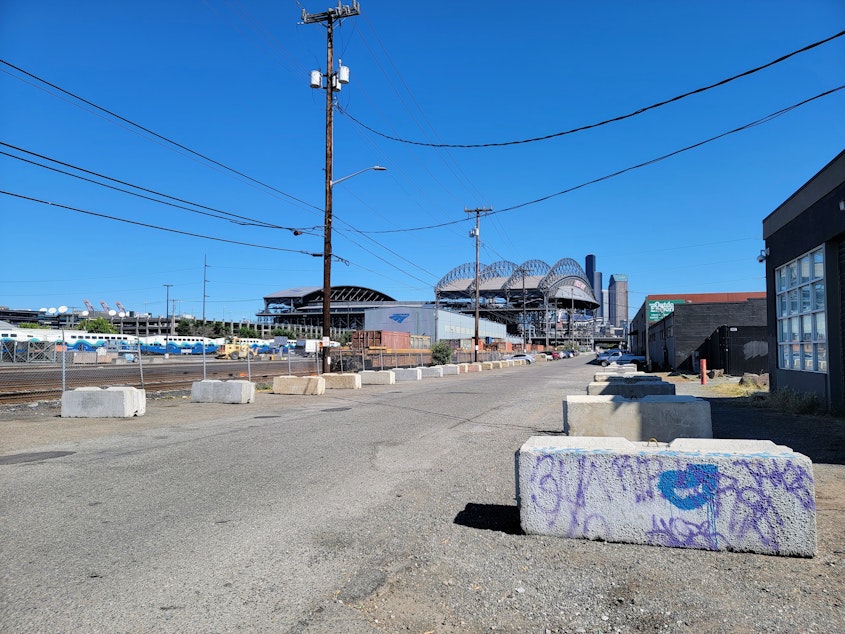Constantly on the move in SoDo, trying not to get swept
People living in tents and vehicles in Seattle’s SoDo neighborhood were shuffled around during Major League Baseball's All Star Week earlier this month. Some say it isn’t just big sporting events that force them to keep moving.
In SoDo, there is nonstop movement. Trucks rumble down potholed alleys. Trains cruise through the neighborhood a few inches from the edge of the road. And people living in their vehicles are constantly parking and re-parking.
One of them is Neal, who likes to just go by his first name after some run-ins with the city.
Neal used to be parked close to the stadiums along with dozens of other people who live in their vehicles.
He got word to move about a month before Seattle hosted All Star Week.
"The All Star Game was coming and pack it up because we will be removing you,” was the message Neal said he received from the city.
Sponsored
Ahead of the All Star Game, Home Run Derby, and other related events, the city closed stretches of Third Avenue to parking. People like Neal had to find new spots on side roads.
"There's stragglers that didn't have nowhere to go because all the good spaces were taken,” he said, pointing down Colorado Avenue South. “The people that could drive to the closest ones, took them. A lot of people lost their motorhomes. It was chaos, they had tow trucks there, they had the cops there."

Right before the All Star events, Neal left Utah Avenue South behind Starbucks headquarters and moved to Colorado, where other people were showing up.
"The aftermath is you can look all over and see it: Everybody is jumbled around, all their friends are gone, we don't know who to trust,” Neal said, shaking his head. “It's terrible."
Sponsored
Neal has lived in his motorhome in this neighborhood for years and says the pace of clearings around All-Star Week has become the new norm.
There used to be streets, he said, where he could park for weeks at a time without being bothered by police.
But now he moves every two to three days and tries to leave before a sweep is announced.
He considers himself one of the lucky ones in the area to own a running vehicle.
"But there's so many people out here that don't,” he said. “They have RVs that are decrepit and falling apart and they're just one sweep away from having the city take it."
Sponsored
Another person who said they're seeing more camp and RV removals in SoDo is Justin Ingram with Vehicle Resident Outreach, a group that helps people living in their vehicles.
"Registration, tabs, small vehicle repair, just to make sure that their vehicles running,” Ingram said, as he stood near a small cluster of RVs and trailers on Alaskan Way South the day before they were removed. “We don't want them to lose their home in the midst of this process."
Ingram said the team used to have the time to reach out to people living on the side of the road and connect them with shelter and services, a process that can take weeks.
These days, he said, they're constantly trying to stay ahead of sweeps.

Sponsored
"Couple more sweep sites that we'll be dealing with,” he said. “That actually takes up the bulk of our time is dealing with sweeps. Yeah, we stay busy."
Seattle Deputy Mayor Greg Wong said there's a reason for these camp clearings. Wong said the city’s Unified Care Team considers all kinds of factors when deciding which tents and RVs to remove.
They include reports of crimes, fires, stolen cars, hygiene, or if a road or sidewalk is being blocked. According to Wong, the process is objective.
"So, there's been no artificial ramp up of those in the area around the stadiums in the lead up to the All Star Game,” he said at a press conference ahead of All Star Week.
He did acknowledge, though, that there has been an increase in camp removals in this neighborhood.
Sponsored
"We all know that SoDo and surrounding areas, disproportionately they have a lot of encampments and RVs,” Wong said. “And so they, since the mayor took office, had kind of a steady stream of removals that are necessary."

In King County, officials estimate more than 53,000 people experienced homelessness at some point last year.
Justin Ingram said, for people in Seattle who want to live in their cars, there are very few options. Citywide parking is limited to 72 hours. Businesses are putting large concrete blocks to prevent parking, though some have been placed on public property.
Those blocks now line many of the alleys where Neal tries to find a place to park his mobile home.
On Colorado Avenue South there aren't any sweep notices posted where Neal is parked, but he and a few others have been parked in the same spot for three days, so he said it's time to go.
"I'm gonna move again today because they're constantly down here messing with us, so I want to get to a place where I can just relax,” he said. “You're constantly under a tremendous load of stress. You don't sleep well, you know, because all you're thinking always, 'OK, what if my RV doesn't start? What if I'm out of gas? What are they going to do? I'm going to lose everything that I have over a battery?’ It's stressful. It's emotionally stressful and physically taxing on us."
King County said it will open a parking lot next month for people like Neal to live.
It will be in Interbay, however, and Neal said he doesn't want to leave his neighborhood.


